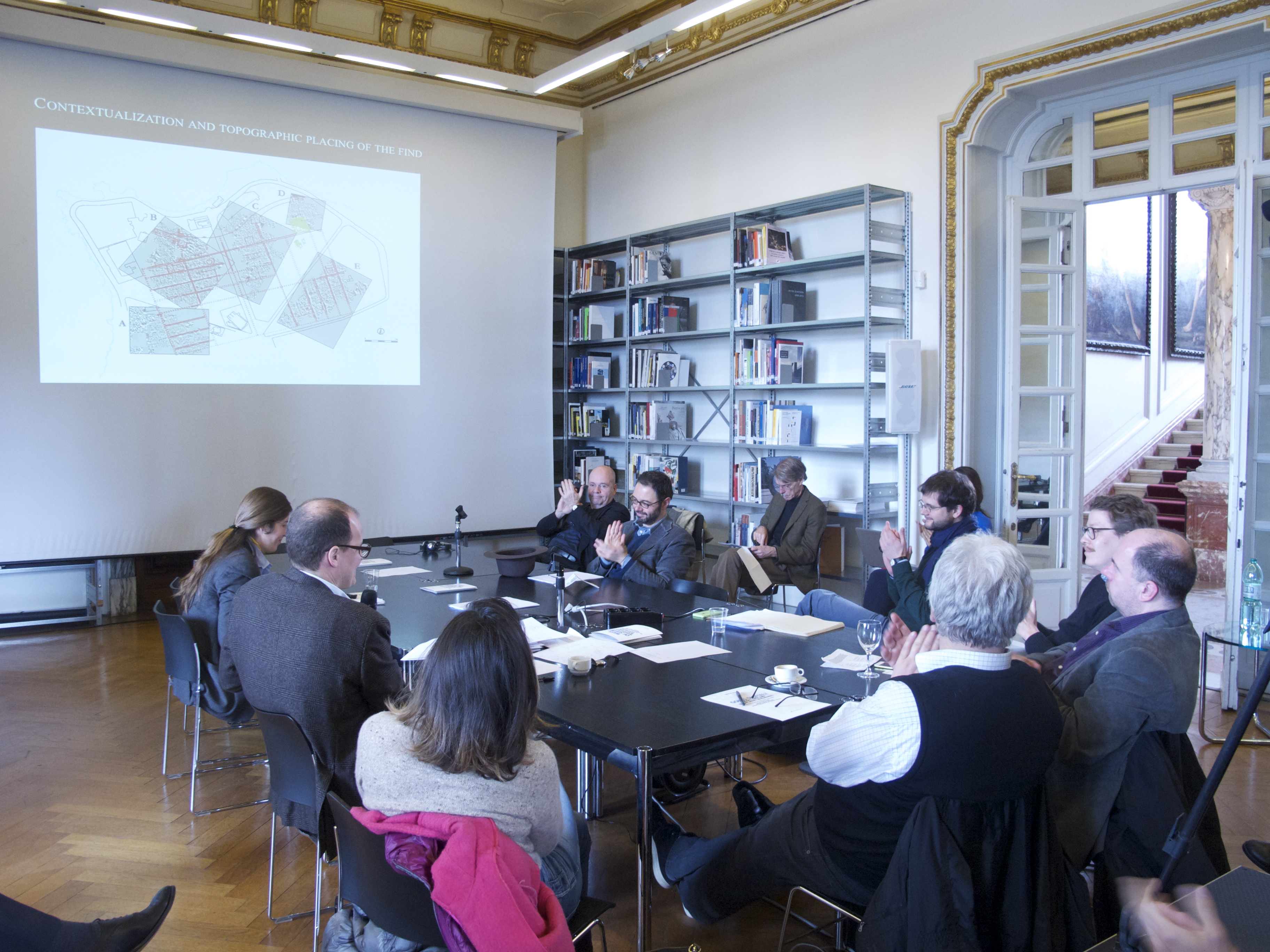Going digital? Images, data, and disciplinary imaginaries
Ways of Seeing
Introduction
Program
Biography
Ways of Seeing
A recent appraisal of “digital” art history makes two critical observations: first, “images do not have a ‘natural’ equivalent in digital form” (Drucker 2015); second, “digitization is not representation but interpretation” (ibid.). This workshop starts from these two observations to discuss the multifaceted relationships between the ontological status of images and empirical data, on the one hand, and the epistemological orientation of disciplines, on the other. The workshop brings together selected art historians, archeologists, and historians of science to reflect upon this question on the basis of particular case studies in the context of digital humanities more broadly.
With Pasquale Beneduce, Henrik Boman, Guelfo Carbone, Lars Berggren, Alessandro di Pietro, Marc Duret, Alessandra Giovenco, Michael Hagner, Thomas Hänsli, Lindsay Harris, Toni Hildebrandt, Christoph Hoffmann, Maria Kraft, Federica Martini, Alessia Mistretta, Ana Shametaj, Philippe Sormani, Letizia Tedeschi, Ariane Varela Braga
Evening lecture, 23 March 2016:
Michael Hagner, ETH Zürich
Digital or Digitalism – another chapter in the history of the humanities?
PROGRAM
Wednesday, 23 March
14.30 Welcome and introduction
Michele Luminati and Philippe Sormani
(Istituto Svizzero di Roma)
15.00 Digitalizing images, revisiting art history
Thomas Hänsli (Art history, ETHZ / UNIZH, Zurich)
15.45 Digitalizing and exhibiting art: some practical and art historical insights
Ariane Varela Braga (Art history, UNIZH, Zurich)
16.45 Imagining a Nation’s Capital: The John Henry Parker Photography Collection (1864-79) in the Digital Age
Lindsay Harris (History of Photography, American Academy in Rome)
18.15 Evening lecture:
Digital or digitalism – another chapter in the history of the humanities?
Michael Hagner (History of Science, ETHZ, Zurich)
Thursday, 24 March
10.00 From image interpretation to archeological finding: techniques of aerial archeology and geophysical prospection
Alessia Mistretta (Archeology, University of Geneva)
10.45 What is data? Notions of Data in Research Activities
Christoph Hoffmann (History of Science, University of Lucerne)
11.45 Photography and cinema as a form of proof between esthetical and judicial truths
Pasquale Beneduce (History of Law, University of Cassino)
13.30 Transfer to Swedish Institute in Rome (via Omero, 14)
15.00 Roundtable: digital humanities, quo vadis? All speakers
16.00 Digital Deserts – film projection: NEW VOID (A. Di Pietro, A. Shametaj – 2014, 30′) and final conversation
Toni Hildebrandt (Art history, University of Berne), Alessandro di Pietro (visual artist) and Ana Shametaj (theatre director)

Michael Hagner, born in 1960, is professor of Science Studies at the Department of Humanities, Social and Political Sciences at ETH Zurich. His research focuses on history of brain’s research, the role of imagines in the scientific research and recently on the history of book in the science.
After studied Medicine and Philosophy at the Freie Universität Berlin, he worked there as a neurophysiologist. He has taught at the Institute for the History of Medicine and Science in Lübeck, and at the Institute for the History of Medicine in Göttingen.
Michael Hagner was visiting professor at the universities of Salzburg, Tel Aviv, Frankfurt am Main and Cologne. Moreover he was visiting scholar at the Wellcome Institute for the History of Medicine in London.
He was a fellow at the Collegium Helveticum, at the Zentrum für Literatur und Kulturforschung in Berlin and at the Maison des Sciences de L’Homme in Paris. Since 1997 he has been senior scientist at the Max Planck Institute.
He has received several honours for his research, and he awarded the Sigmund-Freud-Preis für wissenschaftliche Prosa by the Deutsche Akademie für Sprache und Dichtung, of which he is a member. He is part of the Leopoldina, and the Akademie der Wissenschaften zu Göttingen.
Among his publications: Homo cerebralis. Der Wandel vom Seelenorgan zum Gehirn (Berlin, 1997), Der Geist bei der Arbeit. Historische Untersuchungen zur Hirnforschung (Wallstein, 2006) and Der Hauslehrer. Die Geschichte eines Kriminalfalls. Erziehung, Sexualität und Medien um 1900 (Suhrkamp, 2010).
Verso il digitale? Immagini, dati e immaginari disciplinari - 23 marzo 2016, Istituto Svizzero di Roma